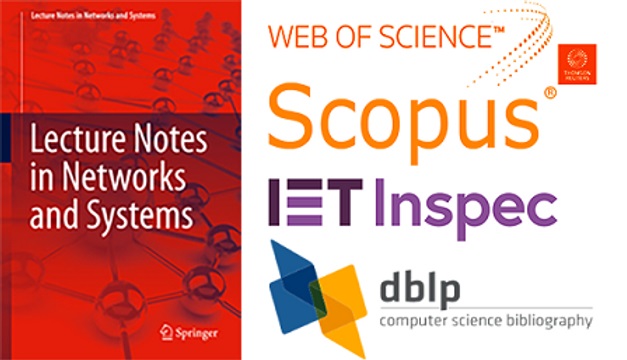NiDS2023 invites submission in the form of Full papers, Short papers, Posters, Doctoral consortium and Workshop/Tutorial papers to be presented and discussed during the NiDS2023 Conference.

All submissions must be original and not simultaneously submitted to another journal or conference.
Submission Instructions
All paper submissions should be made through EasyChair platform.
Only submissions in .pdf format will be accepted. All submissions should be in English.
Authors may choose to prepare their paper either in LaTeX or MsWord, using Springer standard book article templates, as follows:
LaTeX:
LaTeX2e Proceedings Templates (zip)
MsWord:
Microsoft Word Proceedings Templates (zip)
All questions about submissions should be emailed to: info@iis-international.org.
License to Publish Agreement
Each paper must be accompanied by a Springer Nature License to Publish agreement. The corresponding author, who is also marked as such in the header of the paper, must sign the agreement on behalf of all of the authors of a particular paper, having gained their permission to do so. He or she signs and accepts responsibility for releasing the material on behalf of any and all co-authors.
Please note that once a paper has been delivered to Springer, changes relating to the authorship of the paper cannot be made.
The corresponding author must sign and upload to EasyChair platform the following consent to publish:
NiDS 2023_Consent_to_Publish_LNNS
Submission Length
The length of each submission’s category is:
| Submission | Length |
|---|---|
| Full Papers | up to ten (10) pages |
| Short Papers | up to six (06) pages |
| Posters | up to four (04) pages |
| Doctoral Consortium | up to four (04) pages |
| Workshop Papers | four (04) to ten (10) pages |
| Tutorial Papers | four (04) to ten (10) pages |
References are included in the page count
Double Blind Evaluation
In order to increase high quality papers and independent merit, the evaluation process of papers is double blind. All papers submitted for review MUST not contain the authors’ names, affiliations, or any information that may disclose the authors’ identity (this information is to be restored in the camera-ready version upon acceptance). Authors should replace names and affiliations with Xs on submitted papers. In particular, in the version submitted for review, they should avoid explicit auto-references, such as “in [1] we show” — consider “in [1] it is shown“; i.e. they may cite previous works, provided that they are not deducible from the text that the cited works belong to the authors. When citing their previous work, they should keep the names with Xs.
Submission Categories
Scientific Papers
NiDS2023 is looking for fundamental research, advanced technology and innovative applications in the field of Intelligent Digital Systems. The contributions can have the form of full/short papers or posters.
Doctoral Consortium
The NiDS2023 Doctoral Consortium (DC) is for PhD students to present and discuss their work during its early stages, meet peers who have related interests, and work with more senior members of the field (mentors).
The DC program is open to all PhD students and invites submissions of papers with advisors or collaborators acknowledged appropriately, as co-authors or otherwise. Students are asked to honor the spirit of the program by submitting only work for which they are primary investigators. Students can submit papers for work reported in a regular paper submitted to NiDS2023, but not for work that has already been published. The Consortium will be scheduled within the main conference program in order to encourage maximal community involvement.
For more information, please click here.
Workshops & Tutorials
NiDS2023 invites individuals and groups to propose workshops, tutorials and industry track sessions.
These sessions are intended to bring together groups of researchers from around the world who have shared interests. The industry track intends to provide a forum for the exchange between academics and researchers with business, business and market representatives.
NiDS2023 encourages a range of events varying in content, aim and structure. Workshops and tutorials can be on any major and timely topic related to nids2023. Possible topics include, but are not limited to tools, practices, theories and methods used by Intelligent Digital Systems.
NiDS2023 invites both “classical workshops,” during which early work is presented in an informal, “mini conference” style, as well as workshops that are highly interactive “working meetings” for a group of people, designed to take advantage of being co-located to work together collaboratively on a theme of shared interest. Tutorials should provide an introduction and possibly in-depth treatment of an NiDS2023 topic under the guidance of an experienced researcher.